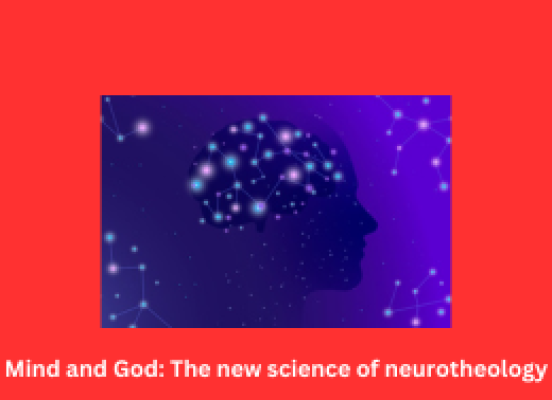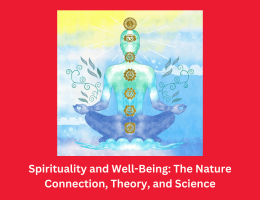
Mind and God: The new science of neurotheology
- By admin --
- Thursday, 23 May, 2024
The discipline of neurotheology continues to extend from its early origins numerous a long time in the past to the cutting-edge. In its only definition, neurotheology refers to the sphere of scholarship that seeks to understand the relationship among the mind and our non secular and religious selves. As I continually like to mention, it's far crucial to consider each aspects of neurotheology very extensively. Thus, the “neuro” facet includes mind imaging, psychology, neurology, medicinal drug, and even anthropology. And the “theology” aspect includes theology itself, however additionally various aspects related to non secular ideals.
The mental fitness advantages of spirituality
Neurotheology also tiers from considering very esoteric principles which includes questions around unfastened will, cognizance, and the soul, to very realistic concepts consisting of understanding how the brain features and the relationship between spirituality and physical and intellectual health. This latter subject matter is probably called “carried out neurotheology.” Applied neurotheology, therefore, seeks to apprehend the health-associated components referring to our mind and our spiritual.
Indirect mechanisms
If there is a courting between spirituality and wonderful mental fitness, we might question what the mechanism of motion is probably. I have usually divided the mechanisms into indirect and direct ones. The oblique mechanisms must do with particular components of a given subculture that emerge as having ancillary intellectual health blessings. For example, going to church or other social events which might be part of a spiritual lifestyle can be useful because social support, in and of itself, is useful to our intellectual fitness.
Most religions additionally train people to keep away from numerous high-threat behaviors that may be very damaging to our intellectual health and nicely-being. For example, maximum religions train us to keep away from alcohol and pills, to no longer be promiscuous, and to try to be compassionate and charitable to others. By following those teachings, human beings will obviously keep away from mental health troubles which include substance abuse and generally tend closer to being more optimistic and less depressed. These effects have nothing to do with being non secular according to se and the whole lot to do with following a religion’s recommendation.
The field of neurotheology continues to make bigger from its early origins numerous a long time in the past to the cutting-edge. In its most effective definition, neurotheology refers to the sphere of scholarship that seeks to recognize the relationship between the brain and our non secular and non secular selves. As I constantly like to mention, it's far crucial to keep in mind both sides of neurotheology very extensively. Thus, the “neuro” aspect includes brain imaging, psychology, neurology, medicinal drug, or even anthropology. And the “theology” facet consists of theology itself, however also numerous components associated with religious ideals, attitudes, practices, and stories.
The mental fitness blessings of spirituality
Neurotheology also degrees from thinking about very esoteric principles inclusive of questions round free will, recognition, and the soul, to very realistic ideas along with understanding how the mind capabilities and the connection between spirituality and physical and mental fitness. This latter topic might be called “applied neurotheology.” Applied neurotheology, therefore, seeks to recognize the health-related aspects concerning our mind and our spiritual selves. In specific, we are able to try to recognize how being non secular or non secular, acting various non secular practices, might be useful to our ordinary health and nicely-being. In our modern day ebook.
A developing number of research have shown how spirituality and intellectual health are connected. Importantly, research have proven that folks that are spiritual and non secular generally tend to have lower prices of melancholy, anxiety, and suicide. This is real across the age spectrum with research of youngsters showing that religious and non secular pursuits are shielding against mental health troubles. And many adults cite spiritual and non secular ideals as critical for coping with diverse life stressors.
Indirect mechanisms
If there is a dating between spirituality and fine mental fitness, we'd query what the mechanism of motion is probably. I even have commonly divided the mechanisms into oblique and direct ones. The indirect mechanisms ought to do with specific elements of a given culture that grow to be having ancillary intellectual fitness advantages. For example, going to church or other social occasions which can be part of a religious lifestyle may be beneficial because social assist, in and of itself, is useful to our mental fitness. The more humans that we've got in our social guide network, the better we're at handling diverse lifestyles stressors which include issues with jobs, relationships, or fitness.
Most religions additionally educate human beings to keep away from quite a few excessive-hazard behaviors that can be very unfavorable to our mental fitness and well-being. For example, most religions teach us to avoid alcohol and drugs, to no longer be promiscuous, and to try to be compassionate and charitable to others. By following these teachings, humans will clearly keep away from intellectual fitness issues including substance abuse and have a tendency towards being more constructive and less depressed. These results don't have anything to do with being spiritual in keeping with se and the whole lot to do with following a religion’s advice
Direct mechanisms
The direct mechanisms of motion must do with unique religious practices or even a person’s private feel of spirituality. Much of my research over the past 30 years has been to look at the brain even as people interact in different practices which include meditation or prayer. We have even observed mind adjustments related to unique spiritual practices which includes speakme in tongues or trance states. The mind results related to those practices are quite top notch and various. It need to come as no surprise considering the fact that those practices affect human beings on many special stages, such as the manner humans think, experience, and enjoy the arena around them. Thus, we have to anticipate to have a look at physiological differences inside the elements of the mind worried with these practices.





